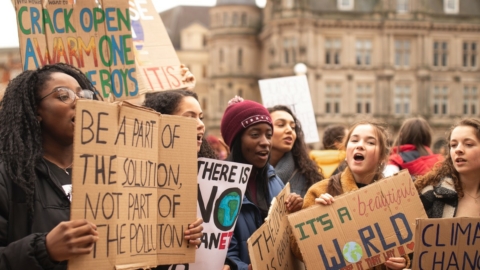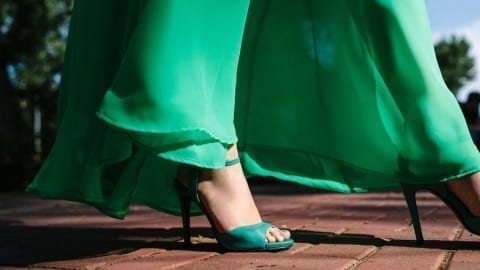The fashion industry is responsible for an astounding 10% of global carbon emissions. According to environmental news and data platform Earth.org, the fashion and clothing industry is using up resources faster than ever and filling up landfills around the world. Sample this: about 100 billion garments are produced each year, and out of these as much as 92 million tons end up in landfills. (1)
To counter the problem of waste in fashion, reusing resources and finding value throughout the product life cycle has become crucial. Even though recycling has been a part of the conversation in fashion for a long time, it is only in the last few years that it has extended to include efforts to regenerate ecosystems and support local communities. This is where the circular economy comes in.
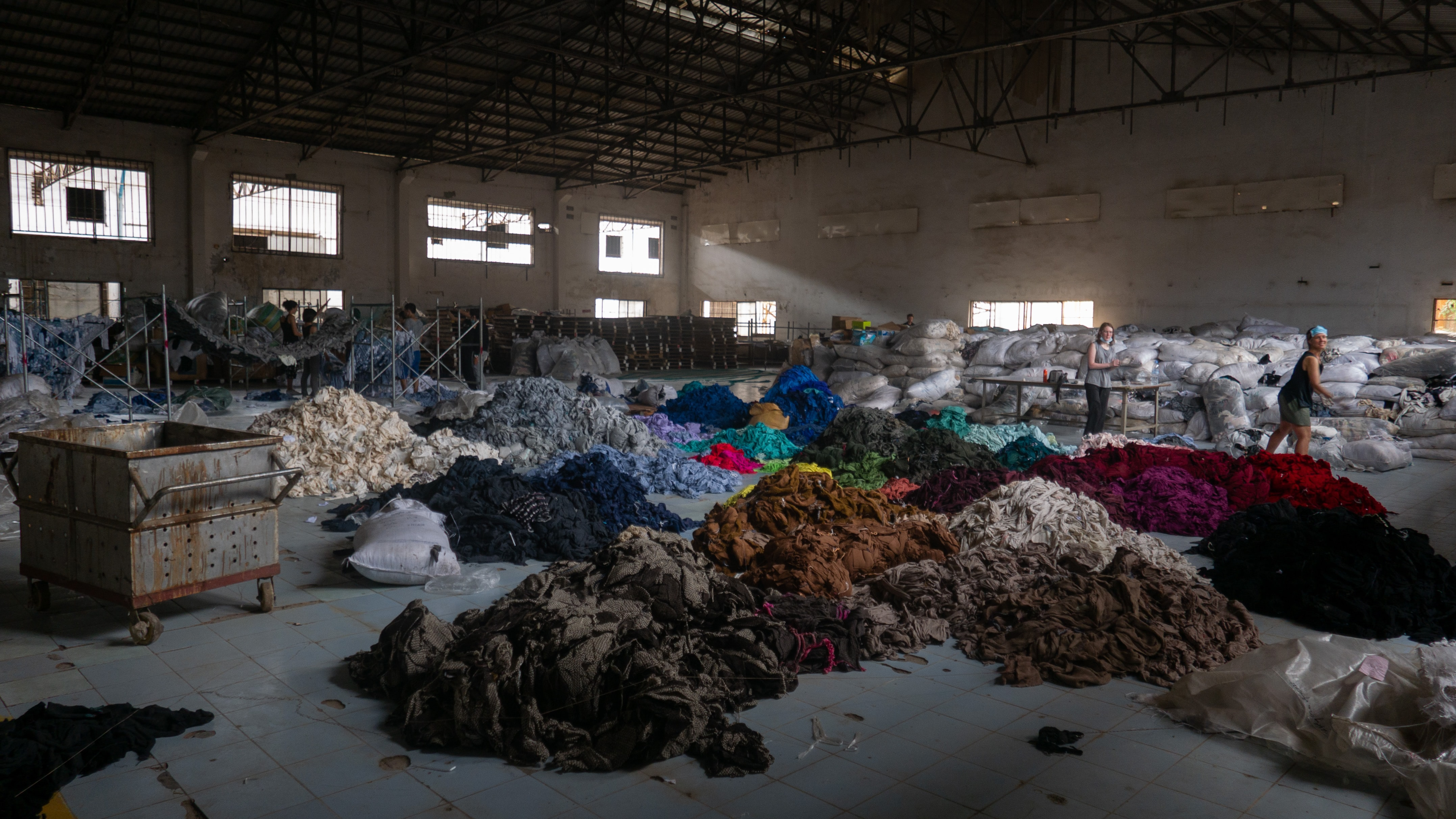
Photo by Francois Le Nguyen on Unsplash
What is a circular economy?
Circular economy is not an entirely new concept. In fact, it is exactly how nature intended things to be — nothing gets wasted. It is the same principle that needs to be applied to fashion and other industries in order to fight waste, discourage copious consumption and the resulting climate crisis.
According to MOTIF, “A circular fashion industry is defined as a regenerative system in which garments are circulated for as long as their maximum value is retained, and then returned safely to the biosphere when they are no longer of use.”
On a broader level, according to the Ellen McArthur Foundation, which is working towards accelerating the transition to a circular economy, the concept implies a “systems solution framework that tackles global challenges like climate change, biodiversity loss, waste, and pollution”. The organization says a circular economy rests upon three principles: eliminating waste and pollution, re-circulating products and materials, and regenerating nature.
The good news is there are multiple brands, startups, and organizations around the world contributing to the circular economy in fashion. If you are looking to buy, sell, donate, or consign clothes, or source from sustainable fashion companies, we have curated a comprehensive list for you:
Sustainable fashion brands
According to consulting firm McKinsey & Company, the fashion industry emits as much greenhouse gases every year as France, Germany, and the UK combined, and it needs to cut these by about half by 2030. (2) Even though the industry is far from the target, there are designers and brands that are leading the way with their efforts towards a circular economy.
1. Zero Waste Daniel
New York-based Zero Waste Daniel uses pre-consumer waste sourced from the city’s garment industry, and other hard-to-recycle materials, to create his line of gender-neutral clothes and accessories.
The upcycled pieces for the label, owned by designer Daniel Silverstein, are made out of 100% pre-consumer cutting room scraps, design room leftovers, and discarded materials. If left unused, this scrap would usually be sent to a landfill or incinerated. According to the Environmental Protection Agency (EPA), the U.S. generated about 17 million tons of textile waste in 2018, representing as much as 5.8% of total municipal solid waste generation that year. (3)
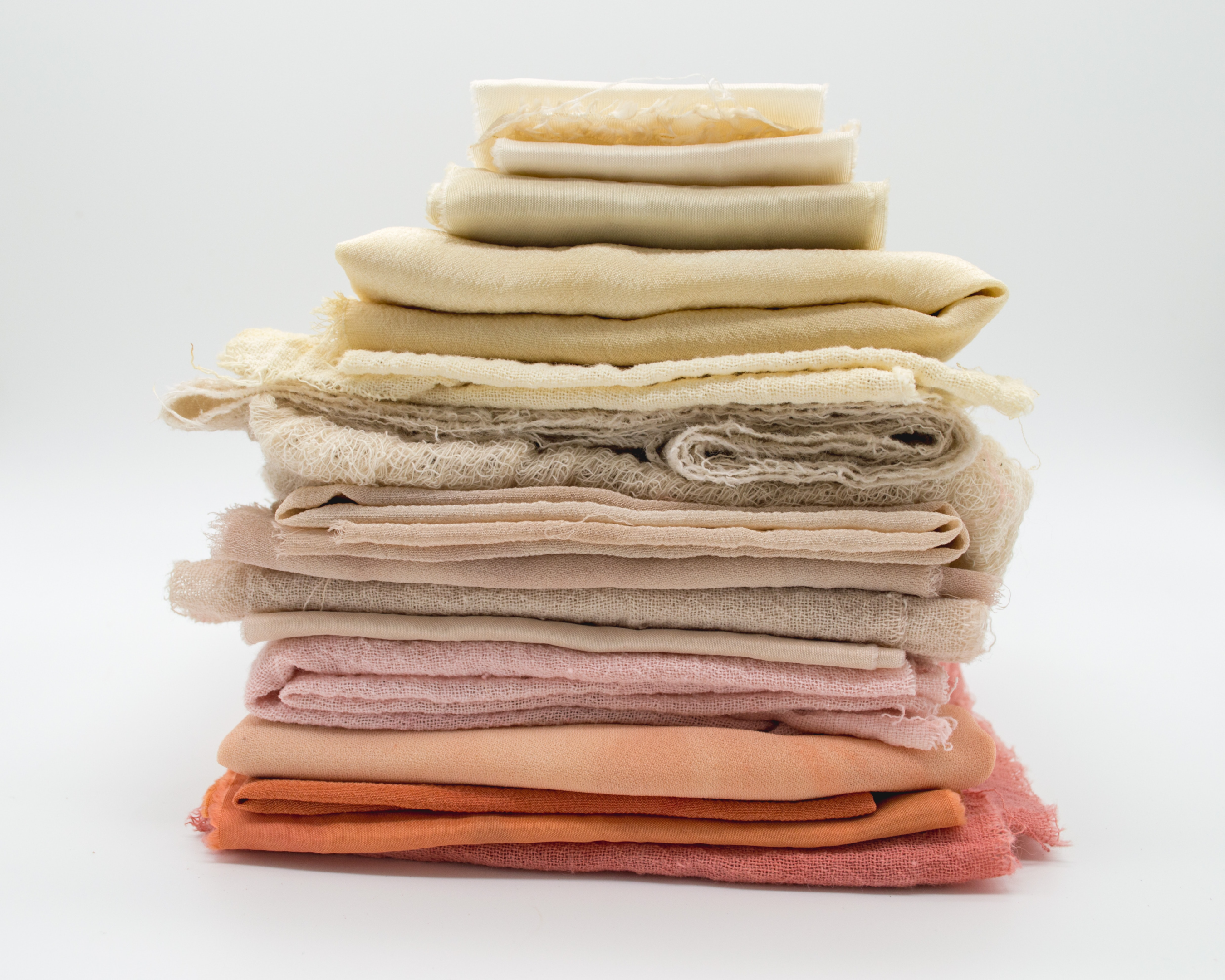
Photo by Mel Poole on Unsplash
2. Malaika New York
Malaika New York, started by Danish-born and Parsons School of Design graduate Malaika Boysen Haaning in 2016, is a sustainable brand that uses upcycled fabrics including bike tubes, regenerated fabrics, and textile offcuts to make its clothing. The brand says it only has a 3% waste rate compared to the industry standard of 30%. The clothes are also locally handcrafted to minimize carbon emissions.
3. Tonlé
Tonlé is a San Francisco-based womenswear brand that started out in 2008, making clothes out of waste. Since then, the brand says it has prevented over half a million pounds of textiles from going to waste. Now, Tonlé is also a collaborative online platform, which showcases its own ethically made products like apparel, accessories, and homeware, and those from other brands that adhere to climate justice and fairness.
The brand is also a participant in the redistribution pledge as part of Reclaim Collaborative’s #ReclaimBlackFriday campaign, which is designed to redistribute a portion of total Black Friday weekend sales to Black and indigenous-led environmental organizations.
4. Mud Jeans
Mud Jeans is making the denim industry a little more sustainable. Jeans are one of the most polluting pieces of clothing, and the Netherlands-based brand intends to change that with its sustainably made denim that can be recycled multiple times over. It is also made using a lot less water compared to regular jeans.
Founded by apparel entrepreneur Bert van Son in 2008, Mud Jeans is a pioneering sustainable fashion brand and a certified B-Corp, or benefit corporation, a distinction that is granted to socially conscious companies. In 2021, the brand says it saved 311 million liters of water and avoided 824,000 kilos of CO2 emissions.
Every pair of jeans produced by Mud Jeans can be recycled into a new pair, leaving zero waste. It also uses natural materials; organic and recycled cotton, and 92% less water compared to regular jeans. In 2022, Mud Jeans was one of the fashion brands to join the anti-Black Friday movement; they closed their online store and sold vintage jeans through a livestream on Black Friday, instead.
5. Patagonia
Patagonia, the outdoor and adventure-wear brand founded by rock climber, environmentalist, and businessman Yvon Chouinard in 1973, is focused on making long-lasting products with recycled materials and offers consumers a program for repair and reuse.
In addition to that, in 2022, Patagonia decided that all of its profits would be committed to its new non-profit committed to fighting the climate crisis — Holdfast Collective, which owns the company’s non-voting stock. Reportedly, this would result in about $100 million going to the Holdfast Collective as dividend during the year. (4)
6. Swedish Stockings
Swedish Stockings is a sustainable hosiery brand that aims to change the way hosiery is made and influence the industry to move towards sustainable production. Started by Swedish businesswomen Linn Frisinger and Nadja Forsberg, the brand designs its tights to last longer.
The company uses polyamide (nylon) sourced from pre-consumer or post-consumer waste materials from nylon industries, like remnants from sportswear industries, to make its stockings. Even though the nylon it uses is an oil-based product, it only uses remnants from other industries, keeping it from being sent to landfills.
7. Outerknown
Outerknown, the sustainable clothing brand founded by professional surfer Kelly Slater in 2014, aims to keep its garments out of landfills by making them long-lasting. In an interview with Forbes, its CEO Mark walker said more than 90% of the brand’s products are made from recycled, regenerated, or organic fibers.
Outerknown also uses new fabrics like Econyl — recycled nylon made from fishing nets and carpet waste, and buttons made from recycled ocean plastic. It provides customers the option to buy and sell pre-owned clothing from the brand to support the circular economy.
Additionally, Outerknown works with Fair Trade Certified factories, which support better working conditions by adhering to rigorous social, environmental, and economic standards.
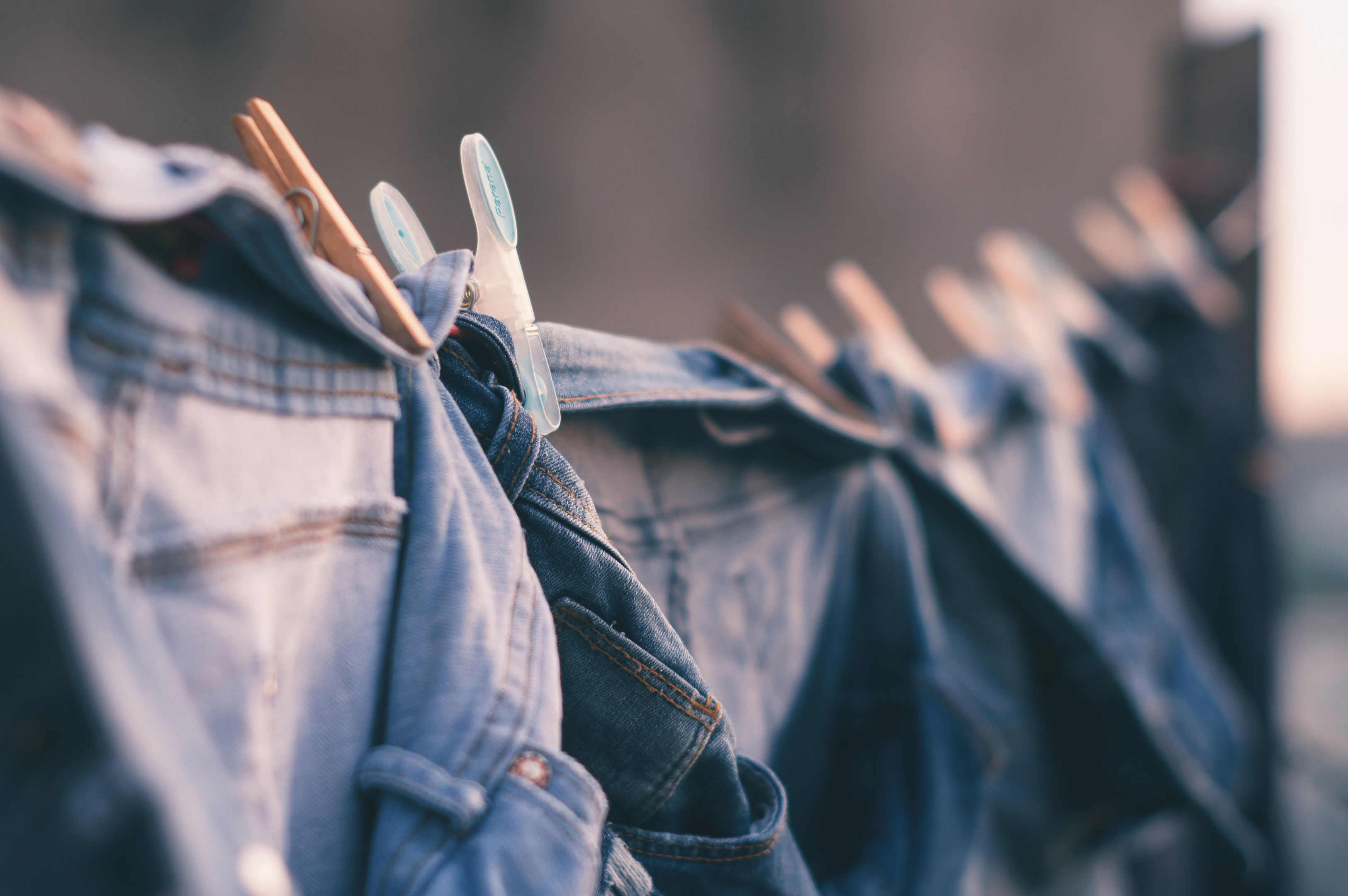
Photo by Bruno Nascimento on Unsplash
8. Sea2See
Sea2See, conceptualized by François van den Abeele in 2015, is an innovative brand using recycled marine plastic collected by fishermen in Spain, France and West Africa to make optical frames and sunglasses in Italy, and watches in Switzerland.
The brand uses UPSEA recycled plastic to manufacture its products and has obtained a Cradle to Cradle Gold certification, a science-based standard for designing and making products for the circular economy. Additionally, Sea2See does not use products of animal origin in their production and has received a PETA-approved vegan label for their collection.
It also uses compostable boxes made of sugarcane as packaging for its eyewear, and plant-based ink. For its watches, the company says it uses cardboard from responsible sources.
Sustainable fashion startups
Innovative startups around the world are changing the way fashion is consumed, by allowing users to rent clothes and accessories instead of buying fast fashion, creating sustainable textiles, and enabling companies to recycle their products. Here are some startups contributing to the circular economy in fashion:
Sustainable Fashion Technical Innovations
9. Vividye
The technology behind Gothenburg, Sweden-based Vividye was developed by two chemists at the country’s Chalmers University of Technology. They developed a solution to tackle color-related inefficiencies that the textile industry faces in reusing and recycling clothes.
The reversible printing technology is being implemented by the company in circular business models. Essentially, their technology helps gently remove prints on garments without harming the material, and allowing the garments to be reprinted again and again. The startup did a capsule t-shirt collection with Swedish retail chain Gina Tricot.
10. Spintex
Spintex, the London-based company was founded in 2018 by biologist and programmer Alex Greenhalgh, material scientist & engineer Martin Frydrych, and Prof. Fritz Vollrath, who leads the Oxford Silk Group at the University of Oxford.
It is a supplier of premium quality, sustainable silk fibers that it creates using its unique technology. Its technology mimics spiders’ silk spinning, which helps reduce water usage, and energy and chemical consumption in textile manufacturing. Its fibers are biodegradable, made from protein, and not genetically modified.
Clothing Rental Companies
11. Rent the Runway
Rent the Runway was founded by two Harvard Business School grads — Jennifer Hyman and Jennifer Fleiss — in November 2009. It now has more than 124,000 active subscribers. (5)
The New York-based e-commerce platform that allows users to rent, subscribe, or buy designer clothes and accessories, aims to make fashion more sustainable by displacing the need for new production and minimizing clothing waste that ends up in landfills.
Rent The Runway offers multiple subscription plans for consumers to pick from. For example, the basic plan allows you to rent four items per month for $94 ($69 in the first month), the $144 plan offers eight designer items a month. If you need more than that, you can opt for $235/month plan that offers 16 designer items every month.
12. ReCircled
ReCircled, founded in 2020 with locations in Cozad, Nebraska and Prato, Italy, is helping brands to keep apparel, accessories, and shoes out of landfills by keeping them in use for longer through sharing, rental, repair, and resale.
In 2022, outdoor brand Timberland announced the launch of a global product take back program, developed in partnership with ReCircled. As part of the plan, the outdoor brand will allow consumers to return any Timberland product at their stores to be repaired, refurbished, upcycled, or recycled.
13. Vince Unfold
Vince Unfold is a subscription-based clothing rental service offered by the fashion brand Vince. The rental service has options for men’s and women’s clothing, shoes, and accessories. It delivers a set of four items to its customers each month with unlimited shipping and exchanges for a flat monthly fee of $160. The company ships to the U.S. and Puerto Rico.
14. Vivrelle
Established in 2018, Vivrelle allows its users to rent designer handbags, jewelry, watches and diamonds for a monthly membership fee. It’s basic plan of $39/month allows members to borrow a piece of jewelery worth up to $1,000 in a month. The most expensive plan is $279, which allows users to rent two items at a time including bags and jewelry.
Other fashion subscription services
There are a number of other fashion subscription services that you can try to be a part of the circular economy instead of buying new products. Some of these are:
- Nuuly lets customers rent 6 fashion pieces every month, for $88 a month.
- Switch allows you to rent handbags and jewelry for as little as $45 a month.
- Le Tote lets customers borrow clothing and accessories for a membership fee starting at $69/month.
- Beekman New York is a jewelry borrowing service that allows you to rent curated pieces from major luxury jewelry houses.
Goodwill, thrift shops, consignment stores
Thrift shops or consignment stores contribute greatly to the circular economy by encouraging reuse of clothes, reducing waste, and extending the life of products. These also help slowing down the production of new clothes. Here are some organizations that collect and sell secondhand clothing:
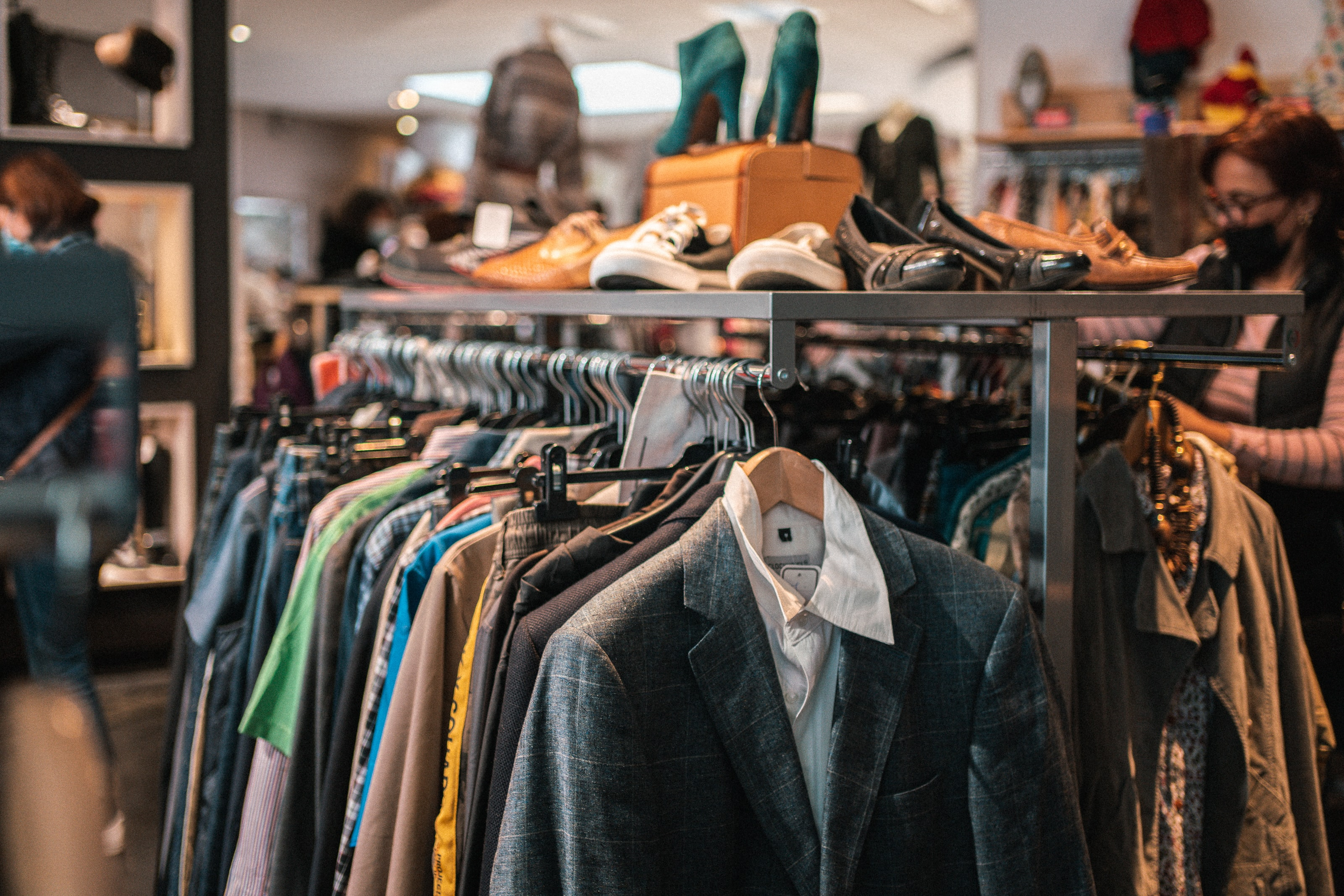
Photo by Hugo Clément on Unsplash
15. Goodwill
Non-profit organization Goodwill, which collects used items, and provides educational and workforce-related services, launched GoodwillFinds, an online marketplace of donated goods in 2022.
“Goodwill is not just the OG of thrifting, it’s also one of the pioneers of the circular economy. Last year, three billion pounds of items were diverted from landfills with the resale of donations made at Goodwill’s 3,300 stores across U.S. and Canada,” GoodwillFinds chief executive Matthew Kaness told the Business of Fashion in an interview. (6) It also operates online marketplace Shopgoodwill.
Meanwhile, the 120 year-old organization continues to sell through its stores in the U.S. and Canada, introducing more than 2,000 new items onto the sales floor each day.
16. Crossroads
Founded in 1991 by Jerry Block and Chip Gerken, Crossroads Trading has been buying and selling secondhand clothing and providing consumers an alternative to new clothes. It allows people to sell on-trend clothes in multiple cities for cash or trade credit, as well as buy products. The company helps the circular fashion economy by keeping clothes out of landfills and sourcing its inventory locally.
It allows customers to sell at its stores, through its drop off and mail-in service; it also has a consignment for high-end designer items, with payouts up to 70% in cash. Crossroads says it uses environmentally-friendly cleaning products and supplies wherever possible, and disposes off damaged and unsold clothing through community donation or textile recycling.
As of 2022, it had about 37 stores across the East Coast, Midwest, Northern and Southern California, Texas, and the Pacific Northwest.
17. Buffalo Exchange
Set up in 1974, Buffalo Exchange buys, sells, and trades clothes and accessories offering customers 25% in cash or 50% in trade on-the-spot for trendy, designer, and vintage clothing. The company has more than 40 stores in the U.S. and Canada.
Buffalo Exchange also runs an innovative “Tokens for Bags” program, under which it offers consumers a 5-cent charity token with each purchase instead of single-use plastic bags. Shoppers are allowed to choose a local non-profit to donate these tokens to. The program, which was started in 1994, has helped raise close to $900,000 for small, local non-profits, and helped keep millions of plastic bags out of circulation. The company, instead allows shoppers to buy reusable totes made out of recycled plastic bottles.
What’s Next?
We hope this round-up of companies that are promoting a circular fashion economy has inspired you to think of fashion in a new way. Maybe resist making that next fast fashion purchase and instead head to a second-hand store to find something unique, or try out one of the clothing rental subscription programs, or try out one of the fashion brands that is using recycled materials in its design. So many interesting options out there to explore!
Sources:
- Earth.org
- The future of fashion: Sustainable brands and ‘circular’ business models
- Advancing Sustainable Materials Management: Facts and Figures Report
- Peak Patagonia: The Story Behind the Mic Drop Heard Round the World
- Rent the Runway shares sink as inflation-weary subscribers hit pause
- Goodwill Launches Resale Site Featuring Luxury Brands Like Gucci and Prada
- Best green credit cards and eco-friendly debit cards - March 12, 2023
- Top Environmental Nonprofits Fighting Climate Change & How to Get Involved! - March 11, 2023
- Sustainable Fashion: 17 innovative companies promoting a circular economy - January 2, 2023






